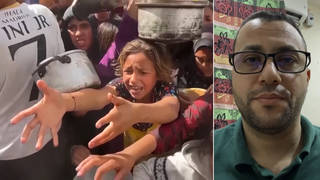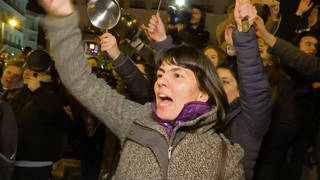
Guests
- Dominic Thomasprofessor at UCLA who specializes in European politics. Thomas is chair of the Department of French and Francophone Studies.
Spain is plunged into a political crisis as the Spanish government moves to impose direct rule over Catalonia, following the region’s independence referendum. On Saturday, Spanish Prime Minister Mariano Rajoy announced the move, stripping the northeastern region of its autonomy in an effort to crush Catalonia’s independence movement. Following an emergency Cabinet meeting on Saturday, Rajoy said he will invoke Article 155 of the Constitution, which has never been used in Spain’s modern democratic history. The speaker of the Catalan Parliament has called Spain’s move to seize political control of the region a “de facto coup d’état.” Puigdemont said that Catalonia’s Parliament will meet in the coming days, amid speculation he might unilaterally declare Catalan independence. For more, we speak with Dominic Thomas, professor at University of California, Los Angeles, who specializes in European politics.
Transcript
AMY GOODMAN: We begin today’s show with the political crisis in Spain. On Saturday, Spanish Prime Minister Mariano Rajoy said he’s moving to impose direct rule over Catalonia, stripping the northeastern region of its autonomy in efforts to crush Catalonia’s independence movement. Following an emergency Cabinet meeting on Saturday, Rajoy said he will invoke Article 155 of the Constitution, which has never been used in Spain’s modern democratic history. Pending its likely approval by the Spanish Senate, Article 155 will allow Spain to fire Catalonia’s elected leaders and seize control of its police forces and public broadcast channel.
The move comes in response to Catalonia’s independence referendum earlier this month. The Catalan regional government said 90 percent of Catalan voters chose independence in the referendum. More than 800 people were injured during the vote, when Spanish police attacked them, the police stormed polling stations, firing tear gas and physically attacking the voters.
This is the Spanish prime minister, Mariano Rajoy, speaking Saturday.
PRIME MINISTER MARIANO RAJOY: [translated] The ability to dissolve the Catalan government, if the Senate decides to do so, the powers of the Catalan Parliament will be transferred to the president of the government. The president of the government, if the Senate decides, will have to call for elections in a maximum of six months. However, I want to do this as soon as possible to recover institutional normality, which, without doubt, is one of our goals for the future. And for that, it is important that we all work for recovering constitutional normalcy.
AMY GOODMAN: Prime Minister Mariano Rajoy’s announcement prompted outrage in Catalonia’s capital, Barcelona, where nearly a half-million people poured into the streets in protest. The speaker of the Catalan Parliament called Rajoy’s order a ”de facto coup d’état.”
CARME FORCADELL: [translated] Today, Prime Minister Rajoy, in an enormous act of political irresponsibility, has crossed all limits. He has announced the execution of a de facto coup of state through which he intends to intervene and take control of the Catalan institutions—an attack against democracy and against the Europe of the 20th century with the goal of ending a democratically elected government.
AMY GOODMAN: Catalan leader Carles Puigdemont called Rajoy’s decision the worst attack on Catalonia since Franco’s dictatorship. Puigdemont said Catalonia’s Parliament will meet in the coming days, amidst speculation he might unilaterally declare Catalan independence.
For more, we’re joined in Los Angeles, California, by Dominic Thomas, professor at University of California, Los Angeles, who specializes in European politics. He’s chair of the Department of French and Francophone Studies.
Welcome to Democracy Now!, Professor Thomas. Can you start off by talking about just what happened over the weekend in Catalonia and, overall, in Spain?
DOMINIC THOMAS: Right. Well, thank you so much for having me on your show.
So, this all started off with the prime minister holding a Cabinet meeting in order to discuss how to proceed with the actual non-declaration of a referendum, but nevertheless to bring, in his mind, the region of Catalonia back into line. The Cabinet supported him. He also spent time building cross-party support, going to opposition parties to make sure that when he goes to the Senate later this week, he has the mandate that he needs to essentially put the region of Catalonia into receivership.
The other extraordinary thing and development was that the king of Spain—and this is a constitutional monarchy, very similar to that of the United Kingdom, where the king is really the figurehead of this country—spoke out again, announcing that there was absolutely no way that Catalonia would at any time separate from Spain. And Rajoy had just returned from the summit of EU leaders, where he came back with strong support from several important players in the European Union.
At that particular point then, the Catalonians responded and spoke out. And I think one of the most symbolic moments was when the leader of Catalonia, Carles Puigdemont, spoke in front of a European Union flag and in front of the Catalonian flag and shifted, during his intervention, into English, appealing to the international community and to bring attention to the fact that as far as they are concerned, their democratic—basic democratic rights are being suspended in the region.
AMY GOODMAN: Well, let’s go right now to the Catalan leader, Carles Puigdemont, speaking this weekend against Spain’s plan for direct rule. At one point in the speech, he switched to English.
PRESIDENT CARLES PUIGDEMONT: If European foundational values are at risk in Catalonia, they will also be at risk in Europe. Democratically deciding the future of a nation is not a crime. This goes against foundations that unite European citizens through the diversity. Catalonia is an ancient European nation. It’s core to the European values. We do what we do because we believe in a democratic and peaceful Europe, the Europe of the the Charter of Fundamental Rights that should protect each and every one of us.
AMY GOODMAN: And I want to turn back to the Spanish prime minister, Mariano Rajoy, speaking Saturday.
PRIME MINISTER MARIANO RAJOY: [translated] The autonomy and self-governance of Catalonia will not be suspended. It will remove the people that put that autonomous government outside of the law and the Constitution and statute. Self-governance will not end. It will be recovered for the sake of legality and for coexistence of all Catalans and not just those who are pro-independence.
AMY GOODMAN: So, that’s the prime minister of Spain. Professor Dominic Thomas?
DOMINIC THOMAS: Right. So, you hear them both, you know, sharing their different perspectives on this. And this is really what has brought this political crisis to the fore, is that the independence leaders are absolutely committed to moving forward with what they see as a mandate delivered to them in the referendum of October 1st. Now, this referendum was, of course, highly problematic, because it had been declared illegal and unconstitutional, and many people stayed home. But Carles Puigdemont feels that the people of Catalonia have spoken, and they want to proceed with this. But the Spanish government insists that, constitutionally, this is just simply not possible, that these 17 states that make up the union of Spain cannot separate, cannot secede from the unitary model that they embraced and signed off on in the 1978 Constitution. And for the time being, neither side has been willing to compromise, although both sides have claimed that they are willing to sit down and to negotiate and to have discussions about this and reach some kind of compromise.
AMY GOODMAN: So what’s stopping that?
DOMINIC THOMAS: What’s stopping it is simply that the independence folks are absolutely committed to going down that path. And as far as the Spanish government is concerned, that is a red line. There is no mechanism in place to allow them to move toward independence. And so, this is really the struggle, is that the leaders want and feel like they have a mandate in Parliament, they’ve been talking about this for a long time, that they want to have a vote on the referendum. And yet it’s illegal. It’s this sort of technical, bureaucratic constitutional process that is preventing them from getting to this.
The irony, of course, is that a few weeks ago no statistics pointed to the fact that an independence vote would win. It seemed that there were people who were disillusioned, who had genuine grievances with the relationship of Catalonia to Spain and that were supporting the movement, but that had there been some negotiations, had some of those grievances been addressed, their support for the referendum would have waned. And yet, the longer that this has gone on, the more it has galvanized people in the Catalonian region, not so much because they believe in the independence referendum, but that the violations of these basic democratic principles have been very troubling and have mobilized people to come out and express support for the independence leaders against the central government.
AMY GOODMAN: Professor Thomas, can you give us background? For people who are sort of parachuting into this right now, trying to understand what this is all about, give us a lesson in Spanish and Catalonian history.
DOMINIC THOMAS: Well, it’s a long history. I mean, the roots of the region go back, one could argue, all to the medieval period, and that the history of the formation of Spain as a constitutional entity, as a monarchy, Catalonia has always been part of that. It is a region that has its specific language, its specific cultural roots, that has been operating economically and politically as part of one of the 17 states, but as an independent state that has developed its own cultural background, forms of expression and so on.
And during the Franco dictatorship, from the late 1930s all the way through to the 1970s, they were persecuted. Their language was banned in schools and so on. And this has left a sudden resentment vis-à-vis the centralized government in Madrid. And for many years now, the folks have been galvanized towards moving towards various measures towards achieving independence. In 2006, they wanted to implement certain changes to their relationship to Madrid, and Madrid refused to ratify them. And since then, the leadership in the region has been gradually moving in the direction of holding a referendum on their future belonging to Spain.
AMY GOODMAN: And talk more about Article 155 and why people of Catalonia are so deeply concerned, it not being invoked since the fascist General Franco was in power.
DOMINIC THOMAS: Right. It’s never been used, and it’s actually, you know, vague. The one thing that’s not vague, as far as Prime Minister Rajoy goes, is that he has the right constitutionally to bring regions into compliance if they attempt to break away from the centralized state. What’s interesting, though, about that dynamic is really the optics, is that if one just looks at the ways in which the government has behaved leading up to the declaration of Article 155—preventing people from going to the ballot boxes at the referendum, incarcerating some of the political leaders from the region, and threatening the head of police, and then bringing the European Union in to support them—is that, in terms of the optics of this, I think that people’s grievances against Madrid and this feeling that the Madrid central government is overreaching have been enforced by this. And this is, of course, one of the main arguments that has been used by the separatists, is that Madrid is too interfering in the region. So even those people who might not have automatically have been in favor of the referendum find this treatment and this way in which the European Union and Prime Minister Rajoy have dealt hypocritically with some of the fundamental questions of democratic rights in the region have disturbed people.
AMY GOODMAN: I mean, 900 people were injured when the Spanish police attacked voters on this referendum day.
DOMINIC THOMAS: Right, and it was completely unnecessary. They declared the referendum illegal and unconstitutional. So, from that point on, they were never going to recognize it. What was the harm in allowing people to go to the ballot boxes? Now, one can talk about the various pros and cons of a kind of micro-nationalist movement within Spain, but it made absolutely no sense, especially in this day of social media, to go in there with that kind of force and to stop people from exercising what they fundamentally believe were their democratic principles. And this is why the situation has escalated and why, when Puigdemont spoke out in English, he is well aware of the fact that the international community is going to be interested in the ways in which Spain is conducting itself right now, especially with all the attention on elections in Europe these days.
AMY GOODMAN: So what’s going to happen next?
DOMINIC THOMAS: Well, later on this week, the prime minister is going to go to the Senate. He’s most likely going to get support, and they’re going to go in and essentially put the region into receivership. In the meantime, the only way out for the separatists and for the Catalonians is to have—is to preempt this by going to Parliament, either declaring unilateral independence, which will of course escalate things even further, or to call regional elections themselves, rather than the central government doing it, and, hopefully, from their point of view, return a Parliament that has being re-democratically elected by the people, that will give them the mandate to hold a referendum. And the outcome of that is highly unpredictable.
This is also what is so problematic about the central government in Madrid insisting that they have regional elections. They already had regional elections. They already returned a democratic region—leaders to that area. And what it looks like is that Madrid is trying to shape the outcome of the election, to hold an election and to hope that a sufficient number of people return a government that is not pro-referendum, and, in so doing, will humiliate the independence leaders in the region. And this will only further divide people living in this part of the country, in which families are being torn apart, businesses are flocking out of the region, and they’re facing a deep economic, as well as political, crisis.












Media Options